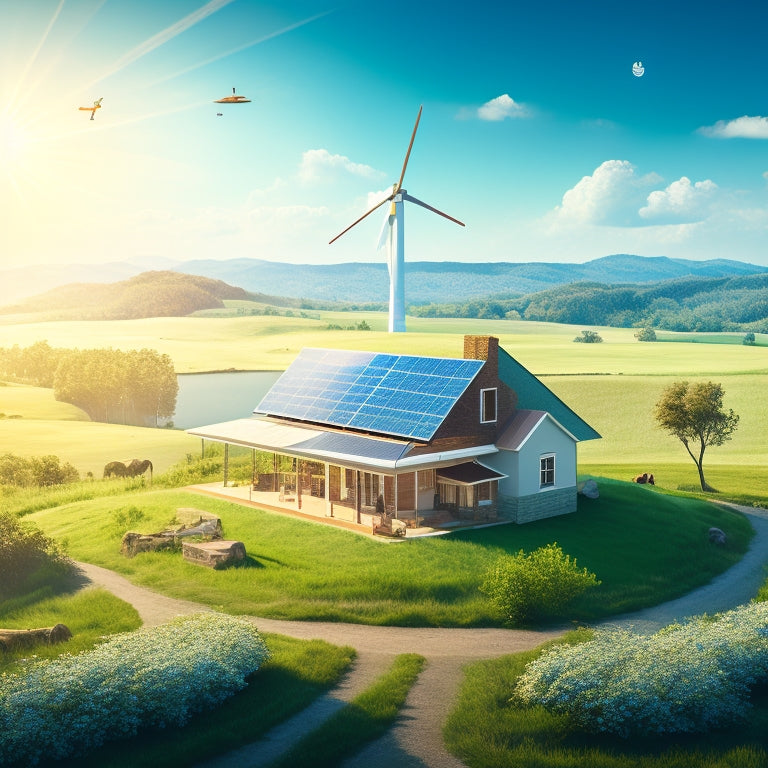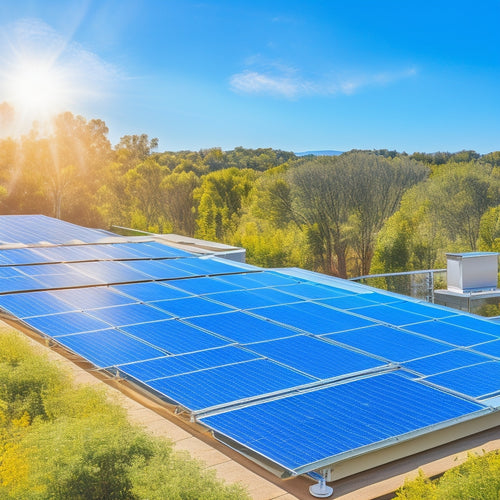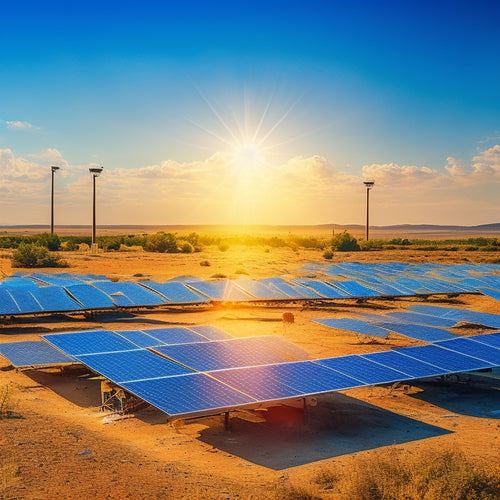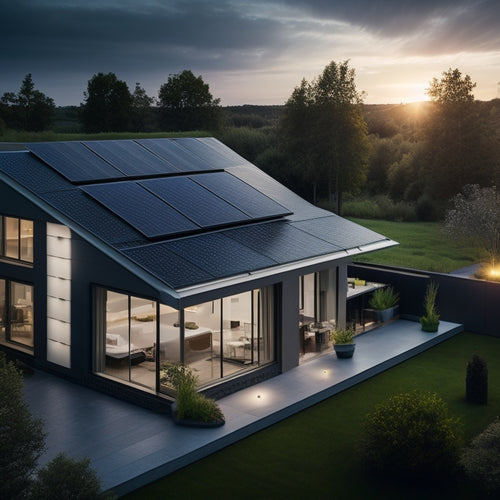
3 Best Solar Solutions for Rural Area Development
Share
You're looking for solar solutions to power rural development, and you're in the right place - three innovative approaches are poised to transform off-grid communities by providing reliable, sustainable energy access. Solar mini-grids offer decentralized energy distribution, engaging local stakeholders for community-specific solutions. Off-grid solar home systems provide cost-effective electricity with low maintenance and a long lifespan. Solar water pumping solutions efficiently irrigate crops and supply water, reducing reliance on fossil fuels. These solutions hold great potential - explore further to discover how they can be tailored to meet the unique needs of your rural development project.
Key Takeaways
• Solar mini-grids provide reliable energy access to rural communities, enhancing energy reliability and promoting rural development.
• Off-grid solar home systems offer cost-effective, low-maintenance energy independence for rural households.
• Solar water pumping solutions efficiently irrigate crops and supply water, reducing reliance on fossil fuels and promoting water conservation.
• Decentralized energy distribution approaches, like solar mini-grids, tailor energy supply to specific community needs, ensuring energy access when needed most.
• Off-grid solar solutions offer a long-lasting, cost-effective alternative to grid extension or generators, promoting rural electrification and development.
Solar Mini-Grids for Rural Communities
Implementing solar mini-grids in rural communities enables you to electrify off-grid areas, providing reliable and sustainable energy access to thousands of people. By doing so, you can enhance energy reliability, ensuring that power is available when it's needed most. This is particularly vital for rural communities, where access to energy can be limited or non-existent. Solar mini-grids offer a decentralized approach to energy distribution, allowing you to tailor the energy supply to the specific needs of each community.
Community engagement is essential in the planning and implementation of solar mini-grids. By involving local stakeholders, you can make sure that the energy solution meets the community's unique requirements and promotes energy reliability. This collaborative approach enables you to identify the most suitable locations for the mini-grid, optimize energy distribution, and provide training and maintenance support to local residents.
Off-Grid Solar Home Systems
With over 1 billion people worldwide lacking access to electricity, off-grid solar home systems offer a cost-effective and reliable solution for individual households in rural areas. These systems allow you to power essential appliances and lighting. They typically consist of a solar panel array, an energy storage system (usually a battery bank), and an inverter. The solar panel array converts sunlight into electricity, which is then stored in the energy storage system for later use.
Here are some key benefits of off-grid solar home systems:
- Energy Independence: You can generate your own electricity, reducing your reliance on the grid or diesel generators.
- Cost-Effective: Off-grid solar home systems can be more cost-effective than extending the grid or using diesel generators.
- Low Maintenance: Solar systems require minimal maintenance and can last for up to 25 years or more.
- Rural Electrification: Off-grid solar home systems can bring electricity to rural areas where grid extension isn't feasible, promoting rural electrification and development.
Solar Water Pumping Solutions
You can efficiently irrigate your crops and supply water to your community using solar water pumping solutions, which harness the sun's energy to power water pumps. This innovative technology offers a reliable and sustainable way to access water, especially in rural areas where traditional energy sources may be scarce. By leveraging solar power, you can reduce your reliance on fossil fuels and minimize your carbon footprint. This, in turn, contributes to water conservation efforts, as every liter of water pumped is optimized for efficient use.
Solar irrigation systems are designed to be durable and low-maintenance, ensuring a consistent water supply for your crops. With a solar water pumping solution, you can irrigate your land more efficiently, increasing crop yields and improving food security. Additionally, these systems can be tailored to meet specific water requirements, ensuring that water is conserved and used wisely.
Frequently Asked Questions
Can Solar Energy Be Used for Rural Telecommunications?
You can leverage solar energy to power rural telecommunications, ensuring network reliability by reducing congestion and signal disruptions, while minimizing tower maintenance and power outages, ultimately providing a more stable connection.
How Do I Maintain and Repair Solar Equipment in Rural Areas?
You'll need to implement dust mitigation strategies, like regular cleaning and protective coatings, to guarantee peak performance. Consider investing in equipment insurance to cover unforeseen repair costs, and develop a maintenance schedule to identify issues before they escalate.
Are There Government Incentives for Rural Solar Energy Projects?
You'll find government incentives for rural solar energy projects, such as Rural Grants and State Rebates, which can greatly offset installation costs, making solar energy more accessible and affordable for rural communities.
Can Solar Energy Power Rural Healthcare Facilities?
You can rely on solar energy to power rural healthcare facilities, ensuring power reliability for critical medical equipment like medical refrigeration units, which store life-saving vaccines and medications, and supporting uninterrupted healthcare services.
Are Solar Solutions Compatible With Existing Rural Energy Infrastructure?
You'll find that solar solutions can seamlessly integrate with existing rural energy infrastructure via grid integration, and energy storage systems guarantee a stable power supply, even when the sun dips below the horizon.
Related Posts
-

What Types of Solar Energy Devices Are Available
You'll find several types of solar energy devices available today, each customized to different energy needs. Photovo...
-

What Happens Without a Charge Controller in Solar Panels
Without a charge controller in your solar panel system, you risk overheating batteries due to overcharging, which can...
-

Home Solar Battery
You're opting for a home solar battery that allows you to utilize the power of the sun during the day and use it at n...


